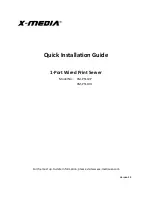
Memory problems
Use this information to solve memory problems.
Table 42. Symptoms and user actions for memory problems
• Follow the suggested actions in the order in which they are listed in the Action column until the problem is
solved.
Parts listing, System x3850 X6 and x3950 X6 Type 6241
” on page 201 to determine which
components are customer replaceable units (CRU) and which components are field replaceable units (FRU).
• If an action step is preceded by
(Trained service technician only)
, that step must be performed only by a
Trained service technician.
Symptom
Action
The amount of system memory
that is displayed is less than
the amount of installed
physical memory.
Note:
If you change memory, you must update the memory configuration in the
Setup utility (see “Using the Setup utility” on page 123 for more information). For
more information about installing DIMMs and DIMM population sequence, see
“Installing a memory module” on page 46, “Independent memory mode” on page 53,
“Lockstep memory mode” on page 57, “Memory mirroring” on page 52, and
“Memory rank sparing” on page 52.
1. If the server was recently installed, moved, or serviced, make sure that all
DIMMs are seated correctly.
2. If a new DIMM has been installed recently, verify that you have not received any
configuration events in the event log. Otherwise, check the IMM event log. If any
DIMM configuration events are listed, resolve the DIMM event problems first.
3. Make sure that:
• No error LEDs are lit on the operator information panel or on the compute
book.
• Memory mirroring does not account for the discrepancy (see “Memory
• The memory modules are seated correctly (see “Removing a memory
module” on page 246 and “Replacing a memory module” on page 247).
• You have installed the correct type of memory (see “Installing a memory
• If you changed the memory, you updated the memory configuration in the
Setup utility (see “Using the Setup utility” on page 123).
• All banks of memory are enabled. The server might have automatically
disabled a memory bank when it detected a problem, or a memory bank
might have been manually disabled.
4. Check the POST event log:
• If a DIMM was disabled by a systems-management interrupt (SMI), replace
the DIMM.
• If a DIMM was disabled by the user or by POST, run the Setup utility and
enable the DIMM.
5. Run memory diagnostics (see “Dynamic System Analysis program” on page
164). If an error is detected, follow the steps to correct the error.
6. Restart the server.
180
System x3850 X6 and x3950 X6 Installation and Service Guide
Summary of Contents for 6241
Page 1: ...System x3850 X6 and x3950 X6 Installation and Service Guide Machine Type 6241 ...
Page 6: ...iv System x3850 X6 and x3950 X6 Installation and Service Guide ...
Page 56: ...42 System x3850 X6 and x3950 X6 Installation and Service Guide ...
Page 82: ...68 System x3850 X6 and x3950 X6 Installation and Service Guide ...
Page 132: ...118 System x3850 X6 and x3950 X6 Installation and Service Guide ...
Page 158: ...144 System x3850 X6 and x3950 X6 Installation and Service Guide ...
Page 214: ...200 System x3850 X6 and x3950 X6 Installation and Service Guide ...
Page 358: ...344 System x3850 X6 and x3950 X6 Installation and Service Guide ...
Page 1938: ...1924 System x3850 X6 and x3950 X6 Installation and Service Guide ...
Page 1964: ...1950 System x3850 X6 and x3950 X6 Installation and Service Guide ...
Page 1968: ...1954 System x3850 X6 and x3950 X6 Installation and Service Guide ...
Page 1975: ...Taiwan Class A compliance statement Appendix F Notices 1961 ...
Page 1976: ...Taiwan BSMI RoHS declaration 1962 System x3850 X6 and x3950 X6 Installation and Service Guide ...
Page 1988: ...1974 System x3850 X6 and x3950 X6 Installation and Service Guide ...
Page 1989: ......
Page 1990: ......
















































